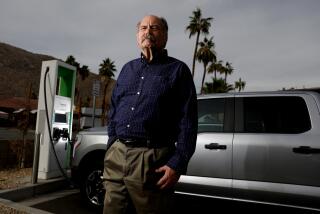FERC Scolded for Lack of Oversight
WASHINGTON — The federal agency charged with policing the nation’s energy markets to prevent price gouging continues to shirk its enforcement duties, a congressional report to be released today concludes.
The Federal Energy Regulatory Commission has promised reforms to prevent a repeat of the abuses that marked California’s 2000-2001 electricity crisis.
But a 10-month investigation by the Senate Governmental Affairs Committee found that FERC is far from becoming a tough cop on the power-market beat, and that it fails to devote sufficient resources to enforcement or respond aggressively to leads.
“FERC has not institutionally accepted regulation and enforcement as a primary mission,” said the report, prepared for the committee’s chairman, Sen. Joseph I. Lieberman (D-Conn.). “It must recognize the need for a total cultural reorientation of its regulatory approach.”
The 52-page report by the committee’s Democratic staff is set to be the main subject of a hearing today on FERC’s oversight of once-mighty Enron Corp., which collapsed in December in what was then the nation’s largest bankruptcy filing. The agency had indications of possible irregularities in Enron’s energy business, but did not follow up, congressional investigators said.
At the least, the report suggested, “more vigilant, aggressive action by FERC” could have “unearthed some of the cracks in Enron’s foundation earlier.”
FERC plans to assign 110 staffers -- about 9% of its personnel -- to a newly formed oversight and enforcement branch. But other regulatory agencies with comparable responsibilities assign a much larger proportion of their staffs to the watchdog role, according to the report, a copy of which was obtained by The Times.
At the Securities and Exchange Commission, the comparable proportion is 33%; at the Federal Trade Commission, it is 60%.
“Given the array of problems FERC faces, it does not measure up well,” the report said. “FERC must devote more resources to market oversight and enforcement.”
FERC Chairman Patrick H. Wood III said in an interview Monday that the comparison “is not an apples-to-apples” one. Dozens of other staff members throughout the agency also have enforcement responsibilities, bringing the total to 250, he said.
Even assuming the 250 number is correct, the report said, only about 20% of the agency’s employees would be committed to market oversight and enforcement.
“I will be more than happy,” countered Wood, “to go back to Congress and ask for more people if I need to.”
With the Senate about to shift to GOP control in the wake of last week’s elections, it’s unclear what repercussions, if any, will flow from the report’s findings.
Republicans are perceived widely to have much closer ties to the energy industry than do Democrats.
The stalled energy bill contains provisions that would give FERC new authority to levy fines for market manipulation, going beyond its current power to obtain refunds. And that legislation has greater chances of passage in a GOP-dominated Congress.
“This isn’t a partisan issue,” said a Democratic committee staff member who asked not to be identified. “We have demonstrated that closer scrutiny of the markets is needed. We’re going to turn it over to the Republicans and say, ‘We hope you follow up on it.’ ”
The report found that Enron lobbied the Bush administration for the appointments of Wood and Nora Brownell, a fellow Republican, to the commission. But it does not allege that the company received any benefit as a result. Soon after their appointments last year, Wood and Brownell voted to impose price limits on wholesale electricity in California, a policy Enron opposed.
Wood said his main concern with his agency’s enforcement branch is how good a job it does, not how many employees it has.
The committee report, however, took issue with FERC’s performance.
Examining a decade of dealings between the company and the agency, the staff concluded that Enron lawyers were generally a step or two ahead of FERC regulators. Although much of the criticism was leveled at Wood’s predecessors, the report found the agency still is slow to react.
One controversy cited in the report involved Enron’s allegedly improper ownership of several wind-generation firms in California. Investigators concluded that a FERC probe launched only last month was too little, too late.
FERC’s action came after the Justice Department and the SEC already were on the case. “FERC failed to give adequate -- or in some cases, any -- scrutiny,” the report said.
FERC rules allow companies that generate electricity from wind or other renewable resources to sell their power above market rates. But under the rules, Enron would not have been allowed to capitalize on this advantage because it also owned a public utility.
Enron allegedly set up a front company to which the wind farms were sold. Named RADR, the company allegedly was created by Enron’s then-chief financial officer, Andrew S. Fastow, and his deputy, Michael J. Kopper.
Fastow now is facing federal prosecution on fraud, money laundering, conspiracy and obstruction-of-justice charges. Kopper pleaded guilty in a plea bargain in August to federal charges of money laundering and conspiracy to commit wire fraud. He is believed to be cooperating with prosecutors.
Committee investigators found that documents the company filed with FERC contained clues that should have prompted questions about whether the wind farms truly were independent.
For example, the documents said an Enron subsidiary was to lend RADR the money to purchase the wind farms.
“FERC was provided with sufficient information to raise suspicions,” the report said. “The record demonstrates a shocking lack of regulatory vigilance.”
More to Read
Inside the business of entertainment
The Wide Shot brings you news, analysis and insights on everything from streaming wars to production — and what it all means for the future.
You may occasionally receive promotional content from the Los Angeles Times.










